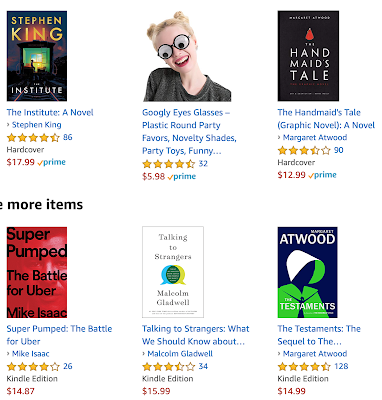"At the first Women’s March, protesters carried signs with slogans like, 'Make Margaret Atwood fiction again!' and 'The Handmaid’s Tale’s not an instruction manual!'"
Writes Michelle Goldberg in "Margaret Atwood’s Dystopia, and Ours" (NYT).
And, you know, that thing about the frog is false. The frog jumps out when it gets too hot. He doesn't just sit there in the water getting used to it while he cooks to death. So you really don't have to pre-jump based on hyped up fears. In that analogy. Assuming it's a good analogy. It's certainly a trite analogy. But so helpful in drumming up hysteria. Nothing happening yet, but we'd better act now, because otherwise if something does happen, we won't notice. So we notice the nothing now because later we won't notice the something because it will seem like nothing. So learn to think that nothing is something because future you thinks something is nothing. How crazy would life be if we used that theory?!
Anyway, Margaret Atwood has a new novel, a sequel to "The Handmaid's Tale," called "The Testaments." Goldberg (with a spoiler alert) reveals the plot. I don't care about the plot or the book other than the way it's important to some people as they go able coping with the reality of Trump's presidency.

What the hell, Amazon??!!

You could argue that all this is melodrama; living under Trump may be degrading, but American women are incomparably freer than those in, for example, Saudi Arabia, a society that seems far closer to Gilead than our own. Then again, in “The Handmaid’s Tale,” America hadn’t crumbled all at once. Recalling her old existence, the book’s heroine wondered at how normal life went on even as horrors filled the newspapers. “Nothing changes instantaneously: In a gradually heating bathtub, you’d be boiled to death before you knew it,” she says.And in a world of gradually heating bathtubs that boil you to death before you notice, you'd never be able to take a bath. But who sets up bathtubs to heat gradually to the boiling point?! Oh, that Margaret Atwood, she's quite the comic writer! Except that wasn't a joke. She really did take that old trope of a frog in a pot of water on the stove — a stove, which is designed to bring pots of water to a boil — and turn it into a bathtub, so it could be a boiling woman and not just a frog.
And, you know, that thing about the frog is false. The frog jumps out when it gets too hot. He doesn't just sit there in the water getting used to it while he cooks to death. So you really don't have to pre-jump based on hyped up fears. In that analogy. Assuming it's a good analogy. It's certainly a trite analogy. But so helpful in drumming up hysteria. Nothing happening yet, but we'd better act now, because otherwise if something does happen, we won't notice. So we notice the nothing now because later we won't notice the something because it will seem like nothing. So learn to think that nothing is something because future you thinks something is nothing. How crazy would life be if we used that theory?!
Anyway, Margaret Atwood has a new novel, a sequel to "The Handmaid's Tale," called "The Testaments." Goldberg (with a spoiler alert) reveals the plot. I don't care about the plot or the book other than the way it's important to some people as they go able coping with the reality of Trump's presidency.
“Writing dystopias and utopias is a way of asking the reader the question, ‘Where do you want to live?’” Atwood said when I talked to her last year. “And where you end up living is going to depend partly on what you do now.” “The Testaments,” it turns out [SPOILER ALERT] isn’t a dystopian work at all. It’s utopian. By the time it’s over, Gilead is a relic, and scholars in a more enlightened time are studying the women who subverted it. Praise be! Our descendants should be so lucky.I went to Amazon to get a link for "The Testaments," and I was amused by the collection of things Amazon suggested for me to "inspired" by my search. Which one of these things is not like the other?

What the hell, Amazon??!!

Comments
Post a Comment